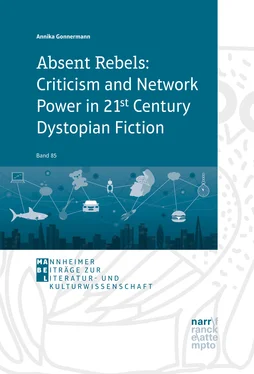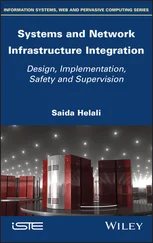Annika Gonnermann - Absent Rebels - Criticism and Network Power in 21st Century Dystopian Fiction
Здесь есть возможность читать онлайн «Annika Gonnermann - Absent Rebels - Criticism and Network Power in 21st Century Dystopian Fiction» — ознакомительный отрывок электронной книги совершенно бесплатно, а после прочтения отрывка купить полную версию. В некоторых случаях можно слушать аудио, скачать через торрент в формате fb2 и присутствует краткое содержание. Жанр: unrecognised, на английском языке. Описание произведения, (предисловие) а так же отзывы посетителей доступны на портале библиотеки ЛибКат.
- Название:Absent Rebels: Criticism and Network Power in 21st Century Dystopian Fiction
- Автор:
- Жанр:
- Год:неизвестен
- ISBN:нет данных
- Рейтинг книги:3 / 5. Голосов: 1
-
Избранное:Добавить в избранное
- Отзывы:
-
Ваша оценка:
- 60
- 1
- 2
- 3
- 4
- 5
Absent Rebels: Criticism and Network Power in 21st Century Dystopian Fiction: краткое содержание, описание и аннотация
Предлагаем к чтению аннотацию, описание, краткое содержание или предисловие (зависит от того, что написал сам автор книги «Absent Rebels: Criticism and Network Power in 21st Century Dystopian Fiction»). Если вы не нашли необходимую информацию о книге — напишите в комментариях, мы постараемся отыскать её.
Absent Rebels: Criticism and Network Power in 21st Century Dystopian Fiction — читать онлайн ознакомительный отрывок
Ниже представлен текст книги, разбитый по страницам. Система сохранения места последней прочитанной страницы, позволяет с удобством читать онлайн бесплатно книгу «Absent Rebels: Criticism and Network Power in 21st Century Dystopian Fiction», без необходимости каждый раз заново искать на чём Вы остановились. Поставьте закладку, и сможете в любой момент перейти на страницу, на которой закончили чтение.
Интервал:
Закладка:
Having established the setting as decidedly capitalist, the novel presents its readers with the consequences of modelling all social interactions according to the rules of business transactions: The Circle criticises the overwhelming power of corporations in particular and the capitalist paradigm more generally by presenting the Circle and its employees as pseudo-eutopians whose real interests lie in the erection of a system that commodifies life, a “monetized […] [e]utopia” ( TC 489). The novel deconstructs the company’s marketed self-image (seemingly dedicated to the ideals of sharing, community, and stabilising democracy) by highlighting that the Circle is actually all about earning money and generating profit (cf. Lascalles): for instance, the company encourages its employees to foster an atmosphere of consumerism, advertising certain products on their social media channels. Their work performance is also evaluated and assessed in terms of their ‘Retail Raw,’ a scale that indicates how much money they encouraged their followers to spend:
So every purchase initiated or prompted by a recommendation you make raises your Conversion Rate. If your purchase or recommendation spurs fifty others to take the same action, then your CR is x50. […] Okay, so your average Conversion Rate so far has been x119. Not bad. But on a scale of 1 to 1,000, there’s a lot of room for improvement. Below the Conversion Rate is your Retail Raw, the total gross purchase price of recommended products. So let’s say you recommend a certain keychain, and 1,000 people take your recommendation; then those 1,000 keychains, priced at $ 4 each, bring your Retail Raw to $ 4,000. It’s just the gross retail price of the commerce you’ve stoked. Fun, right? ( TC 252)
As Mae soon learns, “the minimum expectation for high-functioning Circlers is a conversion rate of x250, and a weekly Retail Raw of $ 45,000” (ibid. 252f., my emphasis), meaning that the employees of the Circle are expected to stimulate consumption and function as a vehicle for advertising.3 Algorithm-based tracking programmes control whether the employees fulfil their quota. This marketing strategy, which anticipates the methods employed by contemporary influencers and Instagram stars, is an integral aspect of their job, proving the Circle to be not a humanitarian project for achieving eutopia but a hipster marketplace for collecting customer data and selling goods to users (cf. Halfmann 275). Examples like these demask the company as a generator for profit which reduces its employees to online peddlers.
Understanding and processing life as a single cost-benefit-analysis, the majority of characters exemplify how familiar neoliberal thinking has become. Regina Martin labels this logic Stenton’s ‘economic efficiency argument’ (cf. 62), thereby commenting on the state of mind necessary to express value solely in economic terms. Based freely on Oscar Wilde’s famous aphorism that these days people “know[…] the price of everything and the value of nothing” ( Lady Windermere’s Fan 82), Eggers’ novel illustrates the inhuman consequences of thinking only in economic terms. In the words of The Guardian journalist Ben Tarnoff, The Circle shows how “[d]ecades of neoliberalism have corroded our capacity to think in non-economic terms” (“Privatization”). The characters are firmly situated within the paradigm of capitalist realism, having been taught “that all fields of human life should be organized as markets” (ibid.). All decisions made at the Circle are legitimised by economic deliberations, for example, by referencing the savings incurred by introducing this change or that initiative. For instance, health insurance and health care are primarily thought of as initiatives to save money, rather than as a measure to save human life. When asked why the Circle is providing free but extensive health care for its employees, the chief physician, Dr Villalobos, explains, “prevention is cheap. Especially compared to finding some Stage-4 lump when we could have found it at Stage 1” ( TC 154). Treating its employees as a resource, the Circle shows how cost-benefit-analyses can permeate various discourses.
The insignificance of individual human lives, already suggested in the example of Dr Villalobos, becomes painfully clear in the next example, which marks a caesura in Mae’s development as a character. Crashing off a bridge after being chased by high-efficiency drones working with geolocation, Mercer, Mae’s ex-boyfriend, becomes the object of a discussion in which both Bailey and Mae demonstrate how much their way of thinking and processing of the world has been colonised by neoliberal ideas of profit maximisation and cost reduction. Having staged his grief for Mae and “her twenty-eight million” watchers ( TC 466), Bailey changes the subject of the conversation, exclaiming “not that it’s about money, but do you know how much it’ll cost to repair that bridge? And what it already cost to clean up the whole mess down below? You put him in a self-driving car, and there’s no option for self-destruction” (ibid. 467). Although Bailey states that this is not “about money,” it is obvious that it is all about money indeed. The CEO successfully turns Mercer’s suicide/death into a benefit-cost analysis, circling around the maintenance of infrastructure. Wasting this opportunity to critically reflect on the reasons for Mercer’s actions, both Bailey and Mae deteriorate further, legitimising another company innovation, self-driving cars, by re-introducing a neoliberal cost-efficiency argument to open up new markets. This direct comparison is explicit, opening the readers’ eyes to the fact that the company is not about establishing eutopia but rather about marketing goods.
As already hinted at, The Circle describes the slow descent of the nation state and democracy as we understand it and substitutes the former with the corporation. Concomitantly, the plot climaxes with the idea that “[c]ost effectiveness becomes the measure of a good democratic process” (Martin 63). It suggests that a private organisation could run the task of a government more effectively and economically – even core functions of democracy like voting:
Washington is trying to save money […] Right now it costs the government about ten dollars to facilitate every vote. Two hundred million people vote, and it costs the feds two billion to run the presidential election every four years. […] If we provide these services for free, we’re saving the government billions of dollars. ( TC 394)
Mae’s proposition to conduct elections via the Circle’s channels is more than welcomed by its CEOs, since it requires “100 percent of the citizenry” to possess a Circle account: an influential step towards monopoly and a guarantee for stable revenue. In fact, as David Lascalles argues, the Circle’s power is founded on providing a single financial identity for its users “through which people can transact and lead their entire lives” (45), meaning that every bank account is connected to one Circle profile. The company is primarily interested in making money of their users. The Circlers thus expose themselves as failed idealists, upholding eutopian notions superficially but seeking true inspiration from the free-market paradigm of commodification. As Ben Tarnoff continues, “[n]owhere is the neoliberal faith […] more deeply felt than in Silicon Valley. Tech entrepreneurs work tirelessly to turn more of our lives into markets and devote enormous resources towards ‘disrupting’ government by privatizing its functions” (“Privatisation”).4 The maxim that money becomes the decisive criterion in legitimising any decision is reinforced by Mae, who states that “[t]here had been some concern […] about a private company taking over a very public act like voting. But the logic of it, the savings inherent , was winning the day” ( TC 395, my emphasis). With the help of the Circle’s neoliberal think tank, stressing the “savings inherent,” democracy is “transformed from a political process […] into a consumer product to be marketed” (Martin 64). By supporting and championing this logic, the Circlers ignore that not all material and immaterial goods should be commodified and marketed in a capitalist world – a questionable process that reduces inalienable human rights to commodities. Equating citizens with consumers and vice versa negates and eradicates the categorical differences between the two concepts. As Martin writes, “[t]he government traditionally provides goods and services to groups and individuals based on a perceived social need. […] When a company worries about customer satisfaction, it is concerned that the individual will continue to purchase a product or a service, not that the product or the service meets a social need” (62).5 Eggers makes this discourse explicit, as his characters vocalise similar positions in all detail, thus tapping into a contemporary controversy surrounding the legitimisation of neoliberal discourses.
Читать дальшеИнтервал:
Закладка:
Похожие книги на «Absent Rebels: Criticism and Network Power in 21st Century Dystopian Fiction»
Представляем Вашему вниманию похожие книги на «Absent Rebels: Criticism and Network Power in 21st Century Dystopian Fiction» списком для выбора. Мы отобрали схожую по названию и смыслу литературу в надежде предоставить читателям больше вариантов отыскать новые, интересные, ещё непрочитанные произведения.
Обсуждение, отзывы о книге «Absent Rebels: Criticism and Network Power in 21st Century Dystopian Fiction» и просто собственные мнения читателей. Оставьте ваши комментарии, напишите, что Вы думаете о произведении, его смысле или главных героях. Укажите что конкретно понравилось, а что нет, и почему Вы так считаете.












